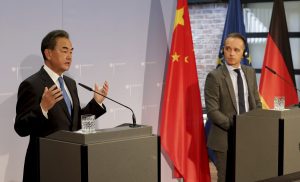Chinese Foreign Minister Wang Yi embarked on a European diplomatic tour during the last week of August, making stops in Italy, the Netherlands, Norway, France, and Germany. The trip is Wang’s first since the outbreak of the coronavirus pandemic, but also comes amid deepening skepticism in Europe about the region’s embrace of China. While Wang’s trip can be seen as business as usual for China’s chief diplomat, it was likely also an attempt at damage control in the face of mounting criticism of Beijing’s handling of the coronavirus. In essence, Wang was seeking to prevent the United States’ tough-on-China stance from spreading across the Atlantic to Western Europe.
The results? Decidedly mixed.
Top of the agenda were efforts to further economic links between China and its European partners. China’s economic recovery shows signs of building momentum after the stagnation brought on by the pandemic, and the Chinese foreign minister appeared to signal a desire to resume investment and trade negotiations. In remarks before the French Institute of International Relations in Paris, Wang highlighted both short and long term economic aspirations: cooperation to stabilize the post-COVID world economy and swift conclusion of a bilateral investment agreement that has been in the works for more than seven years. Longer term, China advocated for greater “green” and “digital” partnerships with the EU, pushing for cooperation in areas including environmental protection, clean energy, information and communications technology, and e-commerce and big data.
In the Netherlands, home to Europe’s busiest port in Rotterdam, Wang urged Dutch leaders to back reforms of the World Trade Organization and called for building a maritime “fast track” to link to the countries’ respective port hubs. In Oslo, he called for further progress in the ongoing negotiations for a China-Norway free trade agreement and expansion of maritime cooperation, including conservation and sustainable use of resources. Norway, the only non-European Union member to feature on Wang’s itinerary, fits into China’s broader foreign policy ambitions, both as a source of oil and seafood imports and as an important Arctic country.
Beyond Wang’s efforts to find common ground with European partners to stabilize supply chains and trade, he pursued a secondary goal: to offer a path forward for multilateral cooperation aimed at confronting transnational challenges. His language choices, from country to country, were no coincidence, simultaneously seeking to draw a contrast between Washington’s approach to foreign relations under the Trump administration and Beijing’s commitment to “unity, cooperation, openness, and inclusiveness.”
Wang’s messaging also held an implicit warning of the possible ramifications and instability that could result from “decoupling,” a “new cold war,” and unilateralism — code for mounting tensions with the U.S. — although Wang abdicated any responsibility on China’s part in fueling the antagonism between the world’s two largest economies. His advocacy of multilateralism likely resonated in the capitals of EU member states, speaking as it does to the core of the European project. However, there remain considerable conceptual mismatches in what multilateralism represents for Beijing what it means for its European partners.
Despite Wang’s push for “win-win” relations, Beijing does not fully control the narrative. While Italian Foreign Minister Luigi di Maio described his meeting with Wang as “very fruitful” and expressed Italy’s intentions to relaunch the bilateral strategic and economic partnership, he did add that Hong Kong’s autonomy, rights, and freedoms must be respected. Human rights concerns followed Wang to the Netherlands, where Foreign Minister Stef Blok raised Hong Kong and China’s policy in Xinjiang with his Chinese counterpart. French Foreign Minister Jean-Yves Le Drian and President Emmanuel Macron, as well as German Foreign Minister Heiko Maas, all raised concerns over human rights in Hong Kong and in Xinjiang. Maas pressed China on Xinjiang and its treatment of Uyghurs, saying that they would “welcome it if China granted U.N. observers access to the camps,” and condemned Chinese threats made against a Czech politician who led a delegation to Taiwan. Hong Kong democracy activist Nathan Law, who fled to the U.K. after the national security legislation passed, led a protest of several hundred outside the foreign ministry, calling for Germany and the EU to take more action on China.
As China and the EU celebrate 45 years of relations this year, Wang’s visit will be book-ended by Yang Jiechi’s arrival in Europe. Yang, a member of the Politburo Central Committee and the director of the office of the Foreign Affairs Commission for the Chinese Communist Party, is slated to visit Spain and Greece this week, adding to China’s diplomatic outreach in Europe.
And yet, what seems increasingly apparent is that despite the value of China’s economic partnership to European states, human rights issues in the mainland and its territories are no longer off the table in high-profile settings. Still, the European rebukes did not rise to the level of opprobrium. For now, “EU-China relations will continue to be awkward,” writes Theresa Fallon in The Diplomat. The pandemic, human rights concerns, and public opinion souring on China across Europe may yet force European leaders to reconsider how best to craft both national and regional policy toward China.

































